外研版英语九年级下册第3单元备课参考
外研社初三下九下Module-3-Life-now-and-then-教案
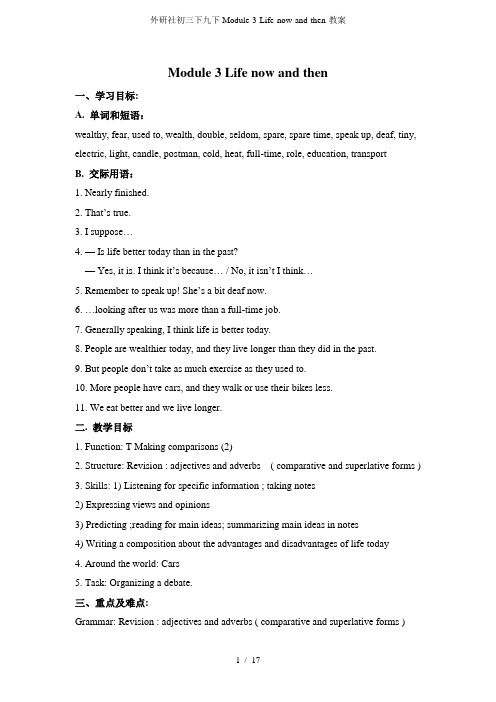
Module 3 Life now and then一、学习目标:A. 单词和短语:wealthy, fear, used to, wealth, double, seldom, spare, spare time, speak up, deaf, tiny, electric, light, candle, postman, cold, heat, full-time, role, education, transportB. 交际用语:1. Nearly finished.2. That’s true.3. I suppose…4. — Is life better today than in the past?— Yes, it is. I think it’s because… / No, it isn’t I think…5. Remember to speak up! She’s a bit deaf now.6. …looking after us was more than a full-time job.7. Generally speaking, I think life is better today.8. People are wealthier today, and they live longer than they did in the past.9. But people don’t take as much exercise as they used to.10. More people have cars, and they walk or use their bikes less.11. We eat better and we live longer.二. 教学目标1. Function: T Making comparisons (2)2. Structure: Revision : adjectives and adverbs ( comparative and superlative forms )3. Skills: 1) Listening for specific information ; taking notes2) Expressing views and opinions3) Predicting ;reading for main ideas; summarizing main ideas in notes4) Writing a composition about the advantages and disadvantages of life today4. Around the world: Cars5. Task: Organizing a debate.三、重点及难点:Grammar: Revision : adjectives and adverbs ( comparative and superlative forms )四、教学设计:Unit 1 They sometimes work harder.ⅠTeaching modelListening and speakingⅡTeaching methodCommunicative and interactiveⅢ Teaching aims1. To understand conversations of comparing life in the past and now2. To understand comparative degree and superlative degree3. To learn how to make comparisonsⅣ Teaching Objectives1. Key vocabulary: wealthy, fear, used to, wealth, double, seldom, spare, spare time,speak up, deaf,2. Key structures:Sentence structureⅤ Teaching aidsTape recorder, OHP , videoⅥTeaching StepsStep 1 Warming up1. Show some pictures to talk.1) Say what life was like in the early 1980s.2) Say what life is like today.2. Introduce new words and expressions.Step 2 Listening practice.1. Ask the students to read through the questions in Activity2.1) What is the history homework?2) What is the question they need to answer?3) What does Betty ask?4) What does Daming ask?2. Play the tape and ask the students to listen to the tape carefully3. Listen and answer the questions.5. Call back the answers from the whole class and check the answers. Keys: Write about life in the past and life today.Is life today better than it was in the past?Betty asks if they can write about medicine and pollution.Daming asks if they can write about personal safety.Step 3 Listen and read.1. Ask the students to listen and read the conversation silently.2. Talk about the pictures.3. Everyday EnglishNearly finished.That’s true.I suppose…4. Now choose the correct answer.1. People live longer because ________.a) we know more about medicineb) they do not work as hard as they didc) they take more exercise2. There is less fear of getting ill ________.a) so people live longerb) because people know how to deal with the ordinary diseasesc) so people work harder than before3. People take less exercise because ________.a) they do not need tob) they drive cars insteadc) they do not have cars or bikes4. People work harder today and ________.a) they do not live as long as they didb) they do not usually have enough free timec) they live a healthier life5. Call back the answers from the whole class and check the answers.Keys: 1. a 2. b 3. b 4. bStep 4 Complete the questions.1. Ask the students to read through the words and expression in the box in Activity 4. deaf doubled fear spare used to wealth2. Complete the questions with the words or expression in the box.1) What kinds of things do you _________?2) What do you do in your _________ time?3) What can someone not do if they are ________?4) If something is _________, is it more or less?5) Do you think people _________ take more exercise than they do today?6) Do you think people have more ________ today than they used to?3. Ask the students to check their answer with a partner.4. Call back the answers from the whole class and check the answers.Keys: 1. fear 2. spare 3. deaf 4. doubled 5. used to 6. wealth5. Now work in pairs. Ask and answer.Step 5 Pronunciation and speaking.1. Play the recording once without stopping.2. Play the recording again and ask the whole class to repeat.3. Read and predict which words the speaker is likely to stress.Some people think life in the past was simpler and healthier than today. More wealth sometimes means less health. When the number of cars is doubled, the pollution is also doubled, or even worse.4. Now listen and check.5. Read the paragraph in Activity 5 aloud.Step 6 Work in pairs.1. Answer the question and give your reasons.— Is life better today than in the past?— Yes, it is. I think it’s because… / No, it isn’t I think…2. Now say what is better or worse in:education environment healthStep 7 Language points1. Remember to speak up! She’s a bit deaf now.记得说话大点儿声,她现在有点儿耳背了。
外研版九年级下册英语M4U3学习教案(1)

外研版九年级下册英语M4U3学习教案一、教学内容本节课选自外研版九年级下册英语M4U3,主要内容包括:Reading 部分“Hollywood's Brightest Star”,涉及好莱坞明星介绍,重点讲解课文中的语言点,同时结合听说读写活动,提高学生的英语综合运用能力。
二、教学目标1. 能够正确理解和运用课文中的重点词汇和句型,如:talent, achieve, performance等。
2. 能够理解并复述课文内容,提高阅读理解能力。
3. 能够通过小组合作,讨论并介绍自己喜欢的明星,培养合作意识和口语表达能力。
三、教学难点与重点1. 教学重点:课文中的重点词汇和句型,以及阅读理解的策略。
2. 教学难点:如何运用所学知识进行口语表达和写作。
四、教具与学具准备1. 教具:多媒体设备,PPT,黑板,教材。
2. 学具:课本,练习本,词汇卡片。
五、教学过程1. 导入:通过展示好莱坞明星图片,引发学生对课文的兴趣,讨论各自喜欢的明星。
2. 阅读前:引导学生预测课文内容,如:Who is the brightest star in Hollywood? Why is she/he so famous?3. 阅读中:学生自主阅读课文,完成相关练习。
教师针对重点句型和词汇进行讲解,指导学生阅读策略。
4. 阅读后:学生进行小组活动,讨论并介绍自己喜欢的明星,运用课文中的句型和词汇。
5. 例题讲解:选取课文中的典型例题,讲解解题技巧,引导学生运用所学知识。
6. 随堂练习:设计相关练习题,巩固所学知识,提高学生的实际运用能力。
六、板书设计1. Hollywood's Brightest Star2. 重点词汇和句型3. 阅读策略七、作业设计1. 作业题目:(1)用课文中的句型和词汇,写一篇关于自己喜欢明星的短文。
(2)根据课文内容,回答相关问题。
2. 答案:八、课后反思及拓展延伸1. 反思:关注学生在课堂上的参与程度,了解他们在阅读理解和口语表达方面的不足,调整教学方法,提高教学效果。
外研版英语九年级下册:Module3Unit3Languageinuse.课程教学设
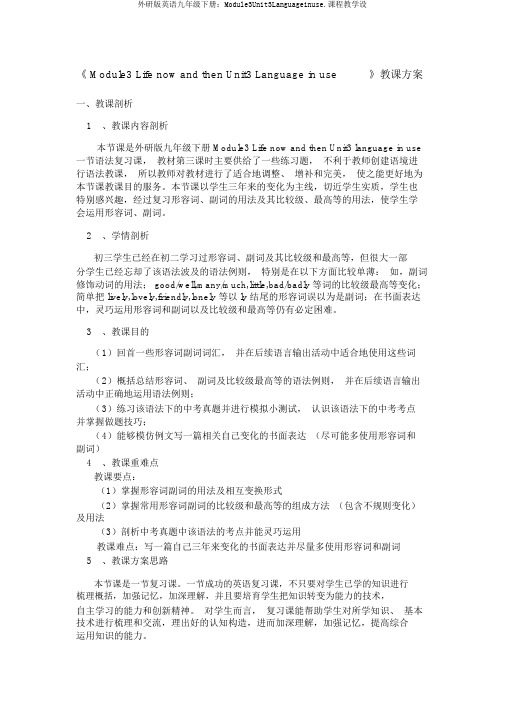
《 Module3 Life now and then Unit3 Language in use》教课方案一、教课剖析1、教课内容剖析本节课是外研版九年级下册 Module3 Life now and then Unit3 language in use 一节语法复习课,教材第三课时主要供给了一些练习题,不利于教师创建语境进行语法教课,所以教师对教材进行了适合地调整、增补和完美,使之能更好地为本节课教课目的服务。
本节课以学生三年来的变化为主线,切近学生实质,学生也特别感兴趣,经过复习形容词、副词的用法及其比较级、最高等的用法,使学生学会运用形容词、副词。
2、学情剖析初三学生已经在初二学习过形容词、副词及其比较级和最高等,但很大一部分学生已经忘却了该语法波及的语法例则,特别是在以下方面比较单薄:如,副词修饰动词的用法; good/well,many/much,little,bad/badly 等词的比较级最高等变化;简单把 lively,lovely,friendly,lonely 等以 ly 结尾的形容词误以为是副词;在书面表达中,灵巧运用形容词和副词以及比较级和最高等仍有必定困难。
3、教课目的(1)回首一些形容词副词词汇,并在后续语言输出活动中适合地使用这些词汇;(2)概括总结形容词、副词及比较级最高等的语法例则,并在后续语言输出活动中正确地运用语法例则;(3)练习该语法下的中考真题并进行模拟小测试,认识该语法下的中考考点并掌握做题技巧;(4)能够模仿例文写一篇相关自己变化的书面表达(尽可能多使用形容词和副词)4、教课重难点教课要点:(1)掌握形容词副词的用法及相互变换形式(2)掌握常用形容词副词的比较级和最高等的组成方法(包含不规则变化)及用法(3)剖析中考真题中该语法的考点并能灵巧运用教课难点:写一篇自己三年来变化的书面表达并尽量多使用形容词和副词5、教课方案思路本节课是一节复习课。
一节成功的英语复习课,不只要对学生已学的知识进行梳理概括,加强记忆,加深理解,并且要培育学生把知识转变为能力的技术,自主学习的能力和创新精神。
外研版九年级下册英语M4U3学习教案
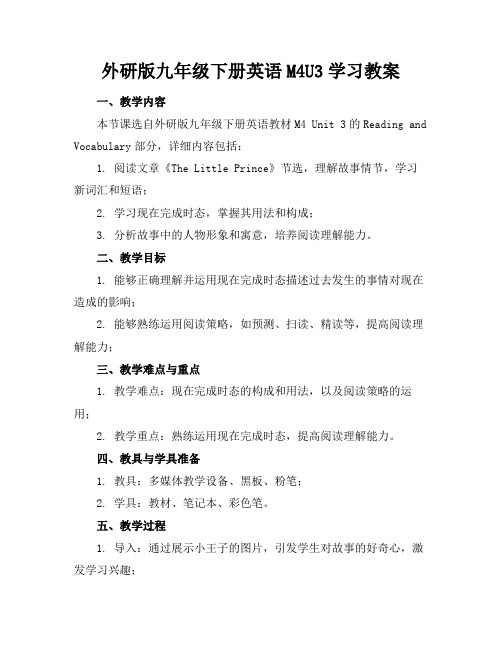
外研版九年级下册英语M4U3学习教案一、教学内容本节课选自外研版九年级下册英语教材M4 Unit 3的Reading and Vocabulary部分,详细内容包括:1. 阅读文章《The Little Prince》节选,理解故事情节,学习新词汇和短语;2. 学习现在完成时态,掌握其用法和构成;3. 分析故事中的人物形象和寓意,培养阅读理解能力。
二、教学目标1. 能够正确理解并运用现在完成时态描述过去发生的事情对现在造成的影响;2. 能够熟练运用阅读策略,如预测、扫读、精读等,提高阅读理解能力;三、教学难点与重点1. 教学难点:现在完成时态的构成和用法,以及阅读策略的运用;2. 教学重点:熟练运用现在完成时态,提高阅读理解能力。
四、教具与学具准备1. 教具:多媒体教学设备、黑板、粉笔;2. 学具:教材、笔记本、彩色笔。
五、教学过程1. 导入:通过展示小王子的图片,引发学生对故事的好奇心,激发学习兴趣;2. 阅读策略指导:指导学生运用预测、扫读、精读等策略进行阅读;3. 阅读文章:让学生独立阅读文章,理解故事情节,学习新词汇和短语;4. 例题讲解:讲解现在完成时态的构成和用法,结合文章中的例句进行分析;5. 随堂练习:设计练习题,让学生运用现在完成时态进行句子练习;6. 小组讨论:分组讨论故事中的人物形象和寓意,培养学生的合作能力和思考能力;六、板书设计1. M4U3 The Little Prince2. 内容:a. 现在完成时态的构成和用法b. 阅读策略:预测、扫读、精读c. 新词汇和短语d. 故事人物和寓意分析七、作业设计1. 作业题目:a. 根据所给图片,运用现在完成时态描述小王子在不同星球上的经历;b. 结合文章内容,分析小王子与狐狸、玫瑰之间的关系,谈谈自己的理解。
答案:1. a. 例如:The Little Prince has visited five planets and met various characters.b. 例如:The relationship between the Little Prince and the fox/rose is a symbol of friendship/love. It teaches us the importance of trust and responsibility.八、课后反思及拓展延伸1. 反思:关注学生在课堂上的参与程度,及时调整教学方法,提高教学效果;2. 拓展延伸:a. 布置阅读任务,让学生阅读《小王子》原著,深入了解故事背景和寓意;b. 开展英语角活动,让学生运用所学知识进行口语交流,提高英语实际运用能力。
外研版英语九年级下册:Module 3 Unit 3 Language in use. 教案设计
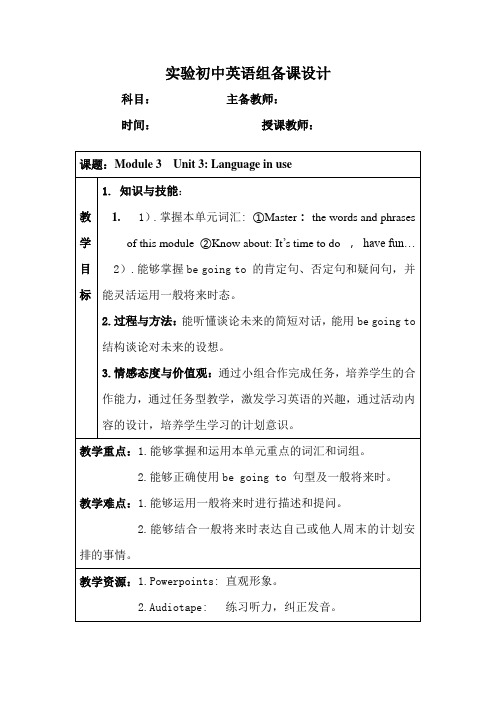
Theyare going to collect litterin the parkon Sunday.
主语be going to do (表将来时态)地点时间
教
后
反
思Hale Waihona Puke 2. Read all thenew words freely.
e some exercises to check the new vocabulary.
Step3: Presentation
1. Learn to greet and say these sentences.
2. Practice the sentences in the small group.
Step 9:Talk about your group diary to the whole class.
Step10.Homework
1.Recite the phrases of this module and structures of future simple.
2.Write a composition to the table.
A:What are you going to do at the weekend?
B:I’m going to…What about you?
A:I’m going to…
Step 8. work in pairs
Make plans to do thingstogetherwith the others in your groups. Make a groupdiaryfor nest weekend.
教学重点:1.能够掌握和运用本单元重点的词汇和词组。
新外研版九年级下册英语 Module 3 Unit 3 教案(教学设计)
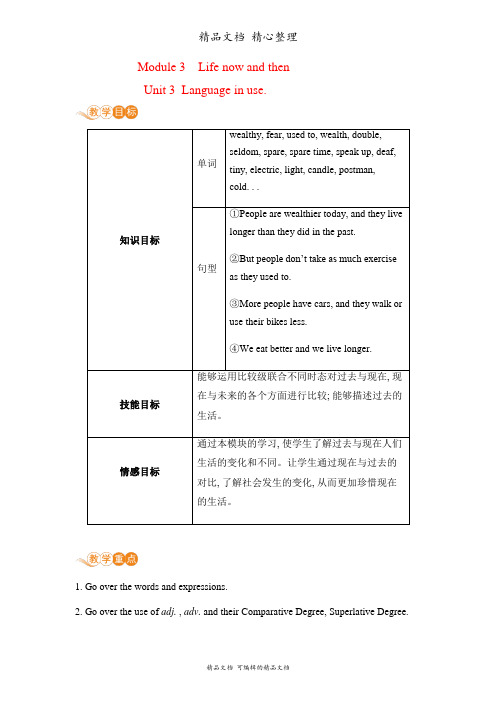
Module 3Life now and thenUnit 3 Language in use.1. Go over the words and expressions.2. Go over the use of adj. , adv. and their Comparative Degree, Superlative Degree.1. How to talk about life now and then.2. Describe the life in the past.教学环节教师活动学生活动备课札记Step 1 Lead inShow the students these words and make them summarize the rules: long —longer —longest healthy —healthier —healthiest large —larger —largest good —better —bestimportant —more important —most important比较级和最高级的变化规则The students summarize the rules of Comparative Degree andSuperlative Degree.让学生们小组合作总结比较级和最高级的变化规则, 培养学生自主学习的意识。
教学环节教师活动学生活动备课札记不规则变化littleStep 2 Grammar Make the students go over thegrammar.形容词和副词的句法作用1. 形容词形容词一般放在名词之前作定语,或放在系动词之后作表语, 或作宾语补足语。
形容词作定语, 一般都是放在名词之前, 但若修饰不定代词 something, anything等则后置。
2. 副词副词一般作状语, 修饰动词、形容Summarize the useof ComparativeDegree andSuperlative Degree.通过总结形容词和副词比较级和最高级的用法,使学生掌握的更加牢固。
外研版九年级下册英语M4U3学习优质教案

外研版九年级下册英语M4U3学习优质教案一、教学内容二、教学目标1. 让学生掌握过去进行时和过去完成时的用法,并能正确运用到实际语境中。
2. 提高学生的阅读理解能力,通过故事学习成功的关键因素。
3. 培养学生的听说能力,使他们在实际交流中能够运用所学知识。
三、教学难点与重点1. 教学难点:过去进行时和过去完成时的区别与运用。
2. 教学重点:阅读理解的技巧和提高学生的听说能力。
四、教具与学具准备1. 教具:多媒体课件、黑板、粉笔。
2. 学具:课本、练习册、笔记本。
五、教学过程1. 导入:通过展示一组成功人士的图片,引导学生讨论成功的关键因素,激发学生的学习兴趣。
2. 阅读理解:让学生快速阅读课文,回答相关问题,提高阅读理解能力。
3. 语法讲解:详细讲解过去进行时和过去完成时的用法,并通过例句和练习巩固知识。
4. 听力训练:播放听力材料,让学生回答问题,提高听力水平。
5. 口语交流:分组进行口语练习,让学生在实际语境中运用所学知识。
6. 随堂练习:设计相关练习题,检查学生对知识点的掌握程度。
六、板书设计1. Reading部分:成功故事的关键信息。
2. Grammar部分:过去进行时和过去完成时的用法及区别。
3. Listening and speaking部分:听力练习和口语交流的要点。
七、作业设计1. 作业题目:根据课文内容,编写一段关于自己梦想的故事,运用过去进行时和过去完成时。
2. 答案:略。
八、课后反思及拓展延伸2. 拓展延伸:推荐相关阅读材料,让学生深入了解成功人士的故事,激发他们的学习动力。
同时,鼓励学生在课后多进行口语练习,提高英语实际运用能力。
重点和难点解析1. 教学难点:过去进行时和过去完成时的区别与运用。
2. 教学目标:阅读理解的技巧和提高学生的听说能力。
3. 教学过程:随堂练习的设计和实施。
4. 作业设计:作业题目的针对性和答案的解析。
一、过去进行时和过去完成时的区别与运用1. 过去进行时表示在过去某个时刻正在进行的动作或状态,通常与某个时间状语连用,如:at that time, at 7 o'clock last night 等。
外研版九年级下册英语M4U3学习教案

外研版九年级下册英语M4U3学习教案一、教学内容本节课选自外研版九年级下册英语M4U3,主要内容包括:Grammar focus: present perfect tense; Fun with English: past participles; Reading: A visit to the UN; Vocabulary:与联合国相关的词汇。
具体章节为第三单元,着重讲解现在完成时和过去分词的用法。
二、教学目标1. 掌握现在完成时的基本结构,能正确运用该时态描述过去发生且与现在有联系的 actions。
2. 学习并掌握过去分词的形式和用法,能灵活运用其描述被动语态。
3. 提高学生的阅读理解能力,了解联合国的相关知识。
三、教学难点与重点难点:现在完成时的运用,过去分词的形式和用法。
重点:现在完成时的结构,即“have/has + 过去分词”;过去分词的构成及在句子中的作用。
四、教具与学具准备教具:多媒体课件、黑板、粉笔。
学具:课本、练习本、字典。
五、教学过程1. 导入:通过展示联合国的图片和视频,引发学生对联合国的好奇心,进而引入本课的主题。
2. 新课内容呈现:a. 讲解现在完成时的结构,通过例句展示其用法。
3. 阅读环节:a. 学生自主阅读Reading部分,了解联合国的基本情况。
b. 教师提问,检查学生对文章的理解程度。
4. 课堂练习:a. 学生完成Fun with English部分,巩固现在完成时和过去分词的用法。
b. 教师挑选部分练习进行讲解和反馈。
5. 小组活动:学生分组讨论,用现在完成时和过去分词描述自己过去的学习经历。
六、板书设计1. 板书左侧:现在完成时的结构,例句。
2. 板书右侧:过去分词的形式和用法,例句。
3. 中间部分:联合国相关词汇。
七、作业设计a. 用现在完成时填空。
b. 用过去分词填空,完成句子。
2. 答案:见附件。
八、课后反思及拓展延伸1. 反思:本节课学生对现在完成时和过去分词的理解和运用程度,调整教学方法,提高教学效果。
外研版英语九年级下册《Module3Unit3》说课稿

外研版英语九年级下册《 Module 3 Unit 3》说课稿一. 教材分析外研版英语九年级下册《Module 3 Unit 3》的主要内容是关于环境保护和可持续发展的。
通过本节课的学习,学生将了解到环境问题的严重性,以及如何从个人做起,为保护环境做出贡献。
教材中包含了丰富的阅读材料,以及各种练习题,旨在提高学生的阅读理解能力,培养学生的环保意识。
二. 学情分析九年级的学生已经具备了一定的英语基础,对于阅读和听力理解能力有一定的掌握。
然而,环境保护这个话题相对比较陌生,需要通过本节课的学习,让学生了解和认识到环境问题的严重性。
因此,在教学过程中,需要注重培养学生的阅读理解能力,同时引导学生思考环保问题,提高他们的环保意识。
三. 说教学目标1.知识目标:学生能够掌握本节课的重点词汇和句型,能够理解和运用教材中的阅读材料。
2.能力目标:通过阅读和讨论,提高学生的阅读理解能力,培养他们的环保意识。
3.情感目标:引导学生从个人做起,积极参与环保活动,为保护环境做出贡献。
四. 说教学重难点1.重点:本节课的重点是学生能够理解和运用教材中的阅读材料,掌握重点词汇和句型。
2.难点:环境保护这个话题对学生来说比较陌生,需要引导学生思考和讨论,提高他们的环保意识。
五. 说教学方法与手段1.教学方法:采用任务型教学法,通过阅读和讨论,引导学生思考环保问题,提高他们的环保意识。
2.教学手段:利用多媒体教学,播放相关的视频和音频材料,帮助学生更好地理解和掌握知识。
六. 说教学过程1.导入:通过播放一段关于环境问题的视频,引起学生的兴趣和关注,导入新课。
2.阅读理解:学生阅读教材中的阅读材料,回答相关问题,提高阅读理解能力。
3.讨论:学生分组讨论,思考环保问题,分享自己的观点和看法。
4.任务型活动:学生分组完成任务,通过实践活动,提高环保意识。
5.总结:教师总结学生的观点和看法,强调环保的重要性,引导学生从个人做起,为保护环境做出贡献。
外研版英语九下Module 3《Life now and then》模块教学设计

外研版英语九下Module 3《Life now and then》模块教学设计一. 教材分析《Life now and then》是外研版英语九下的一个模块,主要讲述了现代生活和过去生活的对比。
本模块包括两个单元,每个单元包含一个阅读文章、一个听力材料和相应的语言操练活动。
教材内容丰富,话题贴近学生的生活,有利于激发学生的学习兴趣和参与度。
二. 学情分析九年级的学生已经具备了一定的英语基础,能够听、说、读、写一些简单的句子。
他们对新鲜事物充满好奇,愿意尝试新的学习方式。
然而,部分学生可能在英语学习上存在恐惧心理,缺乏自信心。
因此,在教学过程中,教师需要关注学生的情感需求,营造轻松愉快的学习氛围,帮助他们建立自信。
三. 教学目标1.知识目标:学生能够掌握本模块的重点词汇、语法和表达方式。
2.能力目标:学生能够听、说、读、写关于现代生活和过去生活的文章。
3.情感目标:学生能够了解并尊重不同文化背景下的生活方式,培养跨文化交际意识。
四. 教学重难点1.重点:本模块的重点是让学生掌握描述现代生活和过去生活的词汇、语法和表达方式。
2.难点:如何帮助学生运用所学知识进行有效的跨文化交流。
五. 教学方法1.任务型教学法:通过设置各种任务,让学生在实践中运用英语,提高语言能力。
2.交际法:引导学生进行小组讨论、角色扮演等交际活动,培养他们的跨文化交际能力。
3.情境教学法:创设真实的生活情境,让学生在情境中学习英语。
六. 教学准备1.教师准备:提前熟悉教材内容,了解学生的学习需求,设计教学活动和任务。
2.学生准备:预习教材内容,完成相关的自主学习任务。
七. 教学过程1.导入(5分钟)教师通过展示两张对比鲜明的图片(现代生活和过去生活),引导学生思考并讨论:What’s the difference between life now and then? 学生发表自己的看法,教师简要介绍本节课的主题。
2.呈现(10分钟)教师通过多媒体展示本节课的重点词汇和短语,如:Internet, mobile phone, transportation等。
外研版英语九年级下册《 Module 3 Unit 3》教学设计

外研版英语九年级下册《 Module 3 Unit 3》教学设计一. 教材分析外研版英语九年级下册《Module 3 Unit 3》的主题是关于环境保护,通过本节课的学习,学生将了解到环境问题的严重性,以及我们应该如何保护环境。
教材中包含了与环境问题相关的词汇和表达方式,以及如何用英语讨论环境保护的方法。
此外,本节课还要求学生能够运用所学的知识,写一篇关于环境保护的短文。
二. 学情分析九年级的学生已经具备了一定的英语基础,能够听懂并运用简单的英语进行交流。
但是,对于一些环境专业术语的理解和运用,可能还需要进一步的引导和帮助。
此外,学生对于环境保护的认识和理解也各有不同,需要在课堂上进行充分的讨论和交流。
三. 教学目标1.知识目标:学生能够掌握与环境问题相关的词汇和表达方式,理解并运用本节课所学的句型进行交流。
2.能力目标:学生能够用英语讨论环境保护的问题,提高自己的英语口语表达能力。
3.情感目标:学生能够认识到环境问题的严重性,提高环保意识,学会用英语表达自己的观点。
四. 教学重难点1.重点:学生能够掌握与环境问题相关的词汇和表达方式,运用所学的句型进行交流。
2.难点:学生能够用英语讨论环境保护的问题,并能够运用所学的知识写一篇关于环境保护的短文。
五. 教学方法本节课采用任务型教学法,通过小组合作、讨论、展示等方式,激发学生的学习兴趣,提高学生的参与度。
同时,教师还采用情境教学法,创设相关的环境问题情境,帮助学生理解和运用所学的知识。
六. 教学准备1.教师准备相关的环境问题的图片和视频,用于导入和呈现环节。
2.教师准备本节课的PPT,包括词汇、句型、阅读材料等,用于展示和讲解。
3.学生准备笔记本和笔,用于记录和整理所学的知识。
七. 教学过程1.导入(5分钟)教师通过展示相关的环境问题的图片和视频,引导学生谈论环境问题,激发学生的学习兴趣。
2.呈现(10分钟)教师通过PPT呈现本节课的词汇和句型,引导学生跟读和模仿,帮助学生理解和记忆。
2017-2018外研版九年级英语下册教案:Module3Unit3

1.分组讨论:学生们将分成若干小组,每组讨论一个与旅行相关的实际问题,如如何描述一次难忘的旅行。
2.实验操作:为了加深理解,我们将进行一个简单的角色扮演活动。学生模拟在旅行中遇到的不同场景,练习使用一般过去时态和旅行词汇。
3.成果展示:每个小组将向全班展示他们的讨论成果和角扮演的结果。
(2)语法:一般过去时态的构成和使用规则对学生来说可能存在困难,如动词过去式的变化规律。教师应通过对比、练习等方法,帮助学生掌握。
(3)阅读理解:文章中涉及的文化差异和背景知识可能影响学生的理解,教师应适时补充相关知识,提高学生的阅读理解能力。
(4)口语表达:部分学生可能在实际运用中,对一般过去时态的运用不够熟练,教师应鼓励学生多开口练习,并提供指导。
4.学生小组讨论:在讨论过程中,学生们积极发表自己的观点,但部分学生的思考深度仍有待提高。在今后的教学中,我将多设计一些开放性问题,引导学生深入思考,提高他们的思维品质。
5.课堂总结:在课堂总结环节,学生对本节课的知识点有了较为全面的掌握。但在实际运用中,部分学生仍存在一定的困难。为此,我计划在课后布置一些相关的练习,帮助学生巩固所学知识。
二、核心素养目标
本章节的核心素养目标旨在培养学生在语言能力、思维品质、文化意识及学习能力方面的提升。1.语言能力:通过学习旅行相关词汇和一般过去时态,使学生能够准确、流畅地描述个人旅行经历,提高英语口语和书面表达能力;2.思维品质:通过分析课文内容,培养学生比较、推断和归纳等思维能力,加深对不同文化背景的理解;3.文化意识:使学生了解世界各地的旅游景点和文化差异,提高跨文化交际意识,培养开放、包容的国际视野;4.学习能力:指导学生运用有效的学习策略,如合作学习、探究学习等,提高自主学习能力和合作能力,为终身学习奠定基础。这些核心素养目标与新教材要求相符,有助于全面提升学生的英语学科素养。
外研版九年级英语下册《Module3Unit 3(1)》教学设计

给学生讲解《中华一题》中的错题。
然后学生把错误改在作业本上。
板书设计
部分形容词或者副词的比较等级
阅读材料中的重点短语等等
教学后记
Activity2:Work in pairs.Look at the pictures and talk about how the town has changed.
练习比较等级
Activity3:Identify the words in the box.
Get the students to read the passage.Then find 3 examples of things that made life harder in the past than it is today.
Step3:讲评错题
Step6:Homework for today
《中华一题》Unit 3
Activity1: get the students to do like this:
Long—longer—longest
Healthy strong good fast high far popular busy hard dangerous easy crowded comfortable dirty…
内容
分析
重点
The usages of the grammars.
难点
正确应用比较等级
关键点
了解比较等级的应用规则
教法学法
Formal and interactive practice
教具
学具
OHP, handouts
九年级英语下册module3全模块教学教案外研版

课时备课表(教案)课时备课表(教案)课时备课表(教案)课时备课表(教案)、课时备课表(教案)20XX—019学年度第一学期生物教研组工作计划指导思想以新一轮课程改革为抓手,更新教育理念,积极推进教学改革。
努力实现教学创新,改革教学和学习方式,提高课堂教学效益,促进学校的内涵性发展。
同时,以新课程理念为指导,在全面实施新课程过程中,加大教研、教改力度,深化教学方法和学习方式的研究。
正确处理改革与发展、创新与质量的关系,积极探索符合新课程理念的生物教学自如化教学方法和自主化学习方式。
主要工作一、教研组建设方面:、深入学习课改理论,积极实施课改实践。
、以七年级新教材为“切入点”,强化理论学习和教学实践。
、充分发挥教研组的作用,把先进理念学习和教学实践有机的结合起来,做到以学促研,以研促教,真正实现教学质量的全面提升。
、强化教学过程管理,转变学生的学习方式,提高课堂效益,规范教学常规管理,抓好“五关”。
()备课关。
要求教龄五年以下的教师备详案,提倡其他教师备详案。
要求教师的教案能体现课改理念。
()上课关。
()作业关。
首先要控制学生作业的量,本着切实减轻学生负担的精神,要在作业批改上狠下工夫。
()考试关。
以确保给学生一个公正、公平的评价环境。
()质量关。
、加强教研组凝聚力,培养组内老师的团结合作精神,做好新教师带教工作。
二、常规教学方面:加强教研组建设。
兴教研之风,树教研氛围。
特别要把起始年级新教材的教研活动作为工作的重点。
、教研组要加强集体备课共同分析教材研究教法探讨疑难问题由备课组长牵头每周集体备课一次,定时间定内容,对下一阶段教学做到有的放矢,把握重点突破难点、教研组活动要有计划、有措施、有内容,在实效上下工夫,要认真落实好组内的公开课教学。
、积极开展听评课活动,每位教师听课不少于20节,青年教师不少于节,兴“听课,评课”之风,大力提倡组内,校内听随堂课。
、进一步制作、完善教研组主页,加强与兄弟学校的交流。
外研版英语九下Module3Unit3教案A

Step6:Homework for today
《中华一题》Unit 3
Activity1: get the students to do like this:
Long—longer—longest
Healthy strong good fast high far popular busy hard dangerous easy crowded comfortable dirty…
内容
分析
重点
The usages of the grammars.
难点
正确应用比较等级
关键点
了解比较等级的应用规则
教法学法
Formal and interactive practice
教具
学具
OHP, handouts
教学程序
教材处理
师生活动
时间
Step1:Activities 1—3
Step2:Reading
Activity2:Work in pairs.Look at the pictures and talk about how the town has changed.
练习比较等级
Activity3:Identify the words in the box.
Get the students to read the passage.Then find 3 examples of things that made life harder in the past than it is today.
课时备课表(教案)
课题
Module3Unit 3(1)
课型
Language in use
外研版英语九年级下册Module 3 Unit 3教案与反思

Unit 3Language in use目标导航教学过程一、方法指导1.在本单元中尽可能多地找出含有形容词和副词比较级的句子,体会其用法。
2.观看小品《昨天今天明天》。
二、预习检测Ⅰ.根据句意用所给词的适当形式填空1.The more careful you are,the fewer(few)mistakes you may make.2.Her husband was not as friendly(friend)to them as her parents.3.Maths is one of the most important(important) subjects.4.If you want to keep fit, you’d better eat more vegetables and less(little) meat.5.The population of Tianjin is smaller(small)than that of Beijing.Ⅱ.单项填空(C)1. The experiment was __________ easier than we had expected.A. moreB. much moreC. muchD. more much(A)2. Since China has been a member of WTO, English is __________ useful than before.A. moreB. mostC. muchD. very(C)3. Wei Hua runs __________ more slowly than Li Fang.A. veryB. nearlyC. muchD. highly(B)4. The weather in China is different from __________.A.one in AmericaB. that in AmericaC. those in AmericaD. the one in America(C)5.Can you tell me which season do you like __________?A. wellB. betterC. bestD. the bestStep1情景导入Teacher shows some pictures to review the text of Unit 1 and Unit 2.Step2语法练习1.全班一起朗读课本中的例句,理解句子意思。
外研版英语九年级下册Module3 Unit3 精品教案
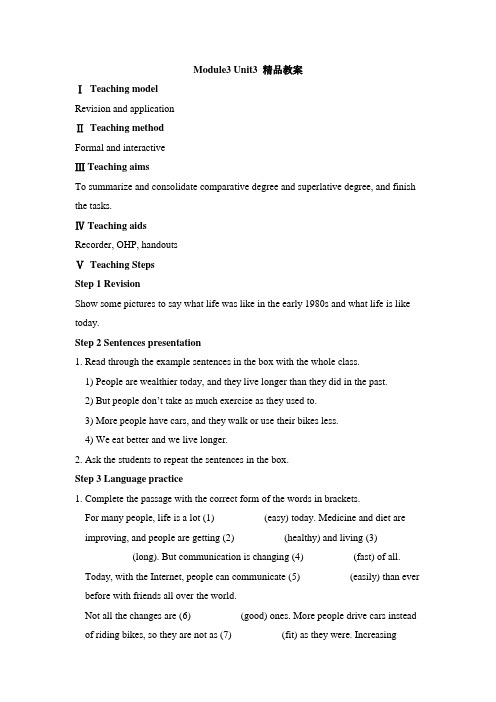
Module3 Unit3 精品教案ⅠTeaching modelRevision and applicationⅡTeaching methodFormal and interactiveⅢ Teaching aimsTo summarize and consolidate comparative degree and superlative degree, and finish the tasks.Ⅳ Teaching aidsRecorder, OHP, handoutsⅤTeaching StepsStep 1 RevisionShow some pictures to say what life was like in the early 1980s and what life is like today.Step 2 Sentences presentation1. Read through the example sentences in the box with the whole class.1) People are wealthier today, and they live longer than they did in the past.2) But people don’t take as much exercise as they used to.3) More people have cars, and they walk or use their bikes less.4) We eat better and we live longer.2. Ask the students to repeat the sentences in the box.Step 3 Language practice1. Complete the passage with the correct form of the words in brackets.For many people, life is a lot (1) _________ (easy) today. Medicine and diet are improving, and people are getting (2) _________ (healthy) and living (3)_________ (long). But communication is changing (4) _________ (fast) of all. Today, with the Internet, people can communicate (5) _________ (easily) than ever before with friends all over the world.Not all the changes are (6) _________ (good) ones. More people drive cars instead of riding bikes, so they are not as (7) _________ (fit) as they were. Increasingtraffic makes the roads (8) _________ (crowded) than ever, and it also makes pollution (9) _________ (bad). We must all work harder to reduce pollution.2. Look at the two pictures and talk about how the town has changed.Use the words in the box to help you.big building busy house modern more shop street tall traffic tree 3. Complete the sentences with the words or expressions in the box.Ask the students to read the words and expressions in the box in Activity 3.heat more than seldom spare speak upAsk the students to read through the sentences in Activity 3.1) We _________ have time to go on holiday.2) We do not have much _________ time because we have important exams thisyear.3) Never go out in the _________ of the day without a hat.4) You have to __________ because the students in the back cannot hear you.5) Mr Smith is __________ a teacher. Most of his punish think of him as theirfriend.Complete the sentences with the words or expressions in the box.Ask the students to check with a partner.Check the answers.Step 4 Reading1. Read the email and find three examples that show life was harder in the past than it is today.2. Read the email again. Find sentences that tell us:1) There was not enough living space for people.2) Most of the big cities were dirty and unhealthy.。
- 1、下载文档前请自行甄别文档内容的完整性,平台不提供额外的编辑、内容补充、找答案等附加服务。
- 2、"仅部分预览"的文档,不可在线预览部分如存在完整性等问题,可反馈申请退款(可完整预览的文档不适用该条件!)。
- 3、如文档侵犯您的权益,请联系客服反馈,我们会尽快为您处理(人工客服工作时间:9:00-18:30)。
Can’ t you see I’ ve got teeth, too? 4. ago 与 before ,表示“在……以前” ago 表示以现在为起点的 “以前”,before 指在过去或将来的某时刻 “以前” 或泛指“以前”。 eg. — When did you have a meeting ? —Three days ago. Mr. Smith said that John had told him all about his past three weeks before.
eg.
The person there is looking for you.
There’ s the house, right in front of you.
Truly he will go to Shanghai.
( 4)兼有两种形式的副词
有些副词有两种形式,一个与形容词同形,一个以
ly 结尾,但它们的含义是不同的。
taste, sound, turn , remain 等连用 eg.
The desk is clean.
The weather is getting warmer and warmer. 用作宾语补足语:
eg.
The news made every one happy.
I think the text very interesting.
你干完那项工作了吗?
2.Talking of free time, don ’ t forget I ’ m going on the school trip next month, and the theatre visit.
说到业余时间,别忘了下个月我要参加学校组织的出游,还要看演出。
talking/ speaking of 表示“谈到……,说到……” 。例如: Talking of John, I saw a friend of his last week.
eg.
He opened the door wide.
English is widely used in the world.
6. free 与 freely
free 的意思是“免费” ; freely 的意思是“无限制地”
eg.
You can eat free in my restaurant whenever you like.
② so 修饰的形容词后可以有一个单数可数名词,其结构是
so + adj. + a / an + n.
试比较: She is so good a girl. She is such a good girl
③如果可数名词复数前有 many, few 或不可数名词前有 much, little 等表示数量多少的形容 词时,用 so 而不用 such。
2.程度副词一般放在被修饰词之前( enough 例外)
eg.
He is very careful.
You are old enough to do t被修饰词之后,修饰及物动词时,放在被修饰的动词 之前或宾词之后,如宾语较长,也可把副词放在动词与宾语之间。
eg.
外研版英语九年级下册第三单元
Unit 1
要点精讲
1.Nearly finished! 快做完了!
这里 finished 是形容词,表示“完成了的,结束了的” 。例如:
I hope I’ll be finished before 5 pm.
我希望 5 点以前能干完。
Are you finished with that work?
1.时间副词和地点副词的位置一般放在句尾。如果这两种副词同时出现在句中,则把地 点副词放在时间副词前面,也可把时间副词放在句首。
eg.
They went boating in Zhongshan Park yesterday.
Yesterday they went boating in Zhongshan Park.
eg.
He went to bed, cold and hungry.
Afraid of troubles ,he would not accept the duty. 典型例题
【例 1 】— How are your parents?
— They are very , thank you.
A. good B. kind
He works hard.
He speaks English very well.
Mr. Wang wrote carefully some letters to his friends.
4.副词修饰名词时, 一般放在该名词之后; 修饰介词时 (如 well ,right ,just , soon 等), 放在该介词前;副词修饰全句时,一般放在句首。
You may speak freely; say what you like.
7. hard 与 hardly
hard 努力地 hardly 几乎不
eg.
He works hard.
She hardly goes to school by bus.
( 5)几组副词用法辨析
1. very 与 much 表示“很”,“非常”。
。
eg.
— People in England eat a lot of potatoes.
— So do we.
3. too, also 与 either 表示“也(不) ”。 too 和 also 用于肯定句, too 多用于口语, also 多用于书面语, either 用于否定句。 eg.
You like playing football. I like playing football, too. ( I also like playing football. ) You don’ t like playing football ,and I don ’ t like playing basketball either. 注意: too 有时也用于否定疑问句中,但表示肯定语气。 eg.
【答案】 A 【解析】 so…that 为“如此怎样以至于如何” ,而 too … to 的意思为”如何如何,以至
于不能作某事” 。但 to 的后面是动词原形,而不是从句。
Unit 2
要点精讲 副词
( 1)副词的分类 副词修饰动词、形容词、其他副词、全句或名词短语及介词。 副词一般可分为以下几类: 1. 时间副词,例如: now, usually, often , always 等。 2. 地点副词,例如: here, there ,out , everywhere 等。 3. 方式副词,例如: hard, well , fast, slowly 等。 4. 程度副词,例如: very, much , still, almost 等。 5. 疑问副词,例如: how, When ,why ,where 等。 6. 关系副词,例如: when , where ,why 等。 7. 连接副词,例如: whether , why, when , how 等。 ( 2)副词的作用 副词在句中作状语、表语、定语和宾语补足语。 eg. I worked in Beijing almost for three years. (状语) Time is up.(表语) The building there looks very grand. (定语) Let the dog out. (宾语补足语) ( 3)副词的位置
提起约翰,上星期我看见他的一个朋友。
Speaking of universities, Roy will go to America to study this summer.
谈到大学,今年夏天罗伊要去美国学习。
3.形容词和副词的用法
A.形容词
( 1)形容词的作用与位置 形容词修饰名词,说明事物或人的性质或特征。 作表语: 与系动词 be,grow,get,become,feel ,appear,prove,seem,look,keep. smell ,
1. close 与 closely
close 意思是“近” ; closely 意思是“仔细地” eg.
He is sitting close to me.
Watch him closely.
2. late 与 lately
late 意思是“晚” ; lately 意思是“最近”
eg.
You have come too late.
2. so 与 such 表示“如此” ,“这么”,“那么”
① so 修饰形容词或副词, such 修饰名词,但名词前可以有形容词定语。
eg.
I can’ t be here so early. 我不能这么早到这儿。
I’ ve never seen such fine drawings. 我从未见过如此精美的图画。
C. well
D. happy
【答案】 C
【解析】由问句得知其询问的是身体如何,所以
well 作为身体状况不错时应视为形容
词。
【例 2 】The girl was
afraid
she threw her bag away.
A. so, that B. too, to C. too, that
D. enough, to
eg.
a small round table
a tall gray building
a dirty old brown shirt
a famous German medical school
an expensive Japanese sports car an interesting English film 作状语,表示伴随状况、原因、结果等:
